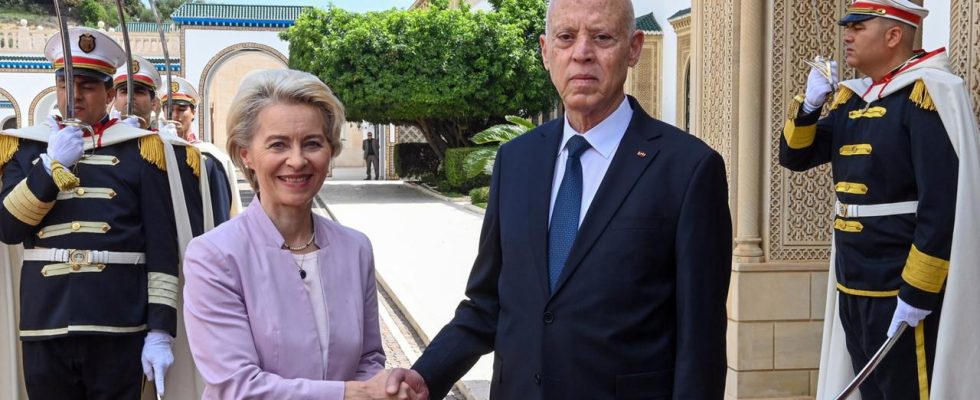Today, the EU interior ministers are once again struggling to agree on an EU pact for asylum and migration. Migration agreements, for example with Tunisia, are praised as a solution. Is Europe kidding itself?
“This agreement is very important. It is very important for Tunisia. And it is very important for the European Union”: EU Commission spokesman Eric Mamer just felt compelled again to emphasize the importance of the migration agreement with the North African country. The most recent reason was tensions with Tunisia, which has just transferred back 60 million euros to the EU that had flowed to Tunis as budget support.
Previously, President Kais Saied had repeatedly canceled a planned visit by EU politicians and finally told Brussels that his country would not accept “anything that resembles grace or alms.”
A misunderstanding? Hardly, says Helena Hahn, migration researcher at the European Policy Center (EPC). The interests simply diverged very far. Tunisia is primarily interested in economic development. That’s why the message is: “We don’t want to play border guards for the EU like Libya or Turkey,” said Hahn – even if the agreements with these countries were concluded under slightly different circumstances.
“Do we even have an agreement?”
But that’s exactly what Europe wants: In July, a delegation led by EU Commission chief Ursula von der Leyen traveled to Tunis to ceremoniously sign a “memorandum of understanding”. It offers Tunisia financial aid of up to 900 million euros if the country stops illegal crossings across the Mediterranean.
In September, 67 million euros were allocated specifically for new ships for the Tunisian coast guard, for thermal cameras to track the boats and everything else needed to take tougher action against smugglers and bring back refugees. But, says Hahn: “Pursuing major migration policy goals under the guise of economic aid doesn’t seem to work.” If one side often does not go along with this informal agreement, one must ask whether there is an agreement at all.
Unreliable, than expected
Three months after the migration deal was signed, Europe has to realize that an increasingly autocratic government in Tunis is proving to be even more unreliable than expected. The desired effect has not yet been achieved: in the week after the agreement was signed alone, around 7,400 people managed to cross from Tunisia to Italy – more than ever before in a week.
And the numbers continue to rise. The EU border protection agency Frontex speaks of more than 130,000 illegal crossings across the Mediterranean this year alone. Around two thirds started in Tunisia towards Italy.
Is it worth sticking with it?
The EU is now in a dilemma. The problems with Tunisia endanger the success of the planned EU pact for asylum and migration. Its goals are to secure the EU’s external borders, limit illegal immigration and enable significantly faster returns out of the EU.
“We as Europeans must define who comes to the European Union and under what circumstances. All of this is based on a comprehensive partnership with countries of origin and transit.” This is how the EU Commission chief von der Leyen just put it again in view of the terrorist attack in Brussels. The perpetrator was a Tunisian who had been noticed several times and whose asylum applications had long since been rejected, meaning he had been in the country illegally for years.
Agreement due to disagreement
EPC researcher Hahn says that the migration agreements are now a cornerstone of EU migration policy: “This is of course also because the member states do not agree internally. They cannot agree on rules for sharing responsibility and on solidarity in distribution and reception of refugees.”
So can the deal still be turned around for the better? There is an urgent need to renegotiate, recommends migration researcher Gerald Knaus, who is considered the inventor of the EU-Turkey deal, in the ARD interview: “We, the European Union, also negotiated with Turkey for six months – initially without any success. There were only promises made and there was no fixed plan or concrete goals as to what we expect from Turkey and what we promise it . Then a very precise paper was presented together. That turned the situation around and the number of arriving migrants fell significantly.”
A few things to clarify
Before the EU seeks further agreements, especially with Egypt, it needs to clarify a few things, recommends migration researcher Hahn: How can it succeed in creating a good balance between expanding legal entry options and more effective border management and return policy? To do this, she must create transparency: “I think that with the experience of the Tunisia deal, the influence on the content of further agreements – both for the EU states and for Parliament – must and will be much greater.”
And the fundamental question also arises: To what extent is the EU prepared to make its migration policy dependent on such unreliable partners? And can it compensate for the lack of solidarity and unity in the long term?

